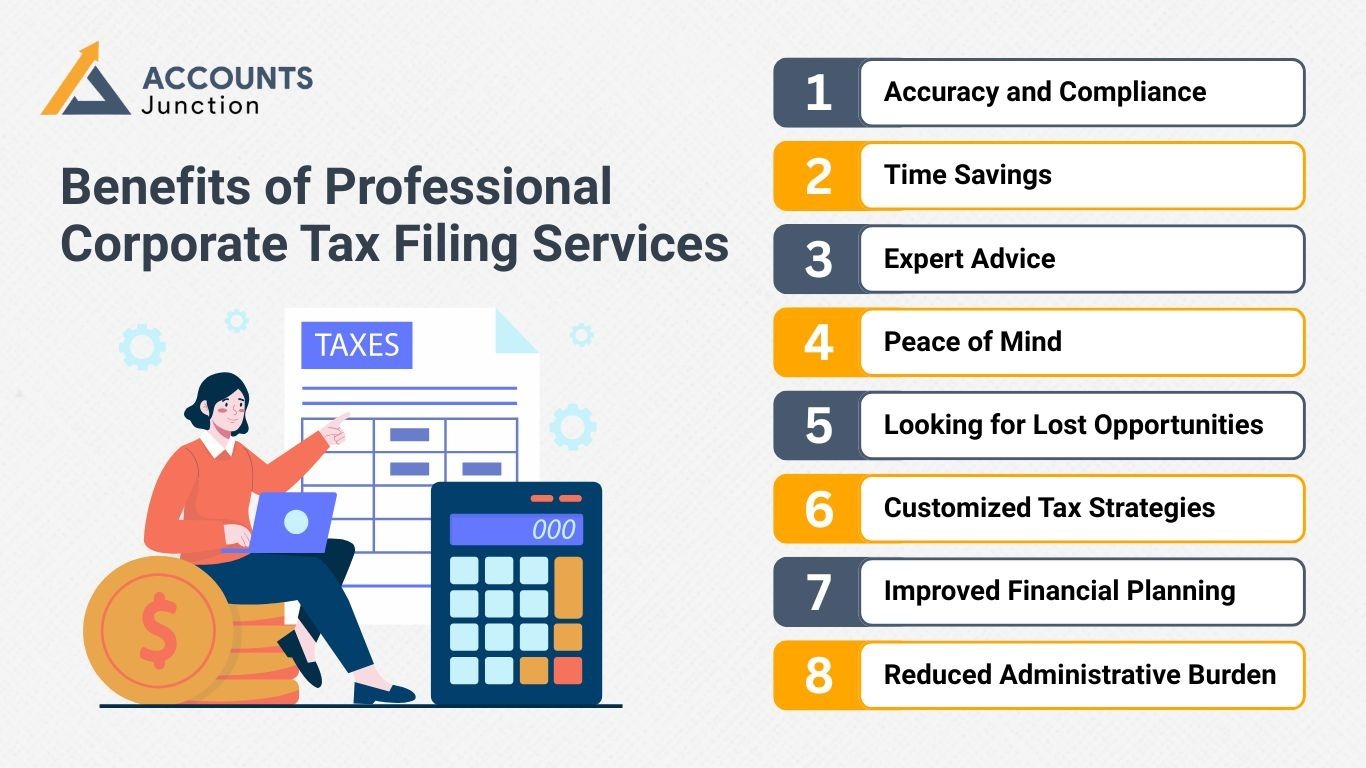
Confused About Corporate Tax Filing? Discover the Right Services Here.
You can think of corporate tax filing as your business's way of telling the government about its money. It means you are showing the government how much your company earns and spends over the year. Every business has to go through this process. Just like you file taxes for yourself, your business needs to file taxes too.
The purpose of corporate tax filing is to find out the tax amount your business must pay. You count your total income, minus your spending, and pay tax on what remains. It helps keep your business in line with the law.
Filing taxes also means having and maintaining good records. For this, you need to track all income and expenses so you can fill out forms correctly. If your records aren’t clear, it can lead to mistakes and trouble with the government.
Key Deadlines and Requirements for Corporate Tax Filing
Corporate tax filing isn't just about paying what you owe. It is also about strict deadlines and following specific rules. Here's a look at the essential dates and requirements you need to be aware of:
Key Deadlines for Corporate Tax Filing:
Federal/National Deadlines:
- The tax filing deadline is set by the national tax authority. Depending on the business entity types (C-corporations, S-Corporations, partnerships), these deadlines may change.
- Businesses should be aware of the exact deadlines for filing their annual returns. You might be allowed to file later. But you have to pay your taxes by the original deadline.
State/Local Deadlines:
- Businesses not only deal with federal taxes but they have to pay state and local taxes too. They have their deadline which may differ from federal /national rules.
- It is necessary to do proper research and follow them correctly.
Estimated Tax Payments:
- Many corporations are required to make tax payments quarterly. This payment is based on their tax liability for the year.
- It is important to estimate your tax correctly so you don't get fined.
Key Requirements of Corporate Tax Filing:
Proper Record-Keeping:
- It is necessary to keep a record of all your financial transactions. This includes your income statements, balance sheets, bank transactions, payroll records, and asset depreciation schedules.
- A proper record of all transactions helps you at the time claims are made on tax returns.
Compliance with Tax Laws:
- Business must update with continuously changing the tax laws and regulation. This contains understanding changes in tax rate, their deductions, credits and reporting requirements.
- If businesses don’t obey the rules it may result in penalties, audits, and legal consequences.
Proper Tax Forms:
- Businesses have to choose the correct tax forms as per their entity types. The IRS and other tax authorities provide specific forms as per different business structures.
- Using the wrong forms can lead to processing delays and errors.
Tax Audits:
- Businesses should be prepared for the possibility of tax audits.
- Good record-keeping and tax compliance reduce the risk of audits. They also help things go smoothly if your business is ever audited.
Tax Planning:
- Businesses should plan their taxes early to cut down what they owe and improve profits.
- This includes finding ways to claim more deductions, credits, and tax benefits.

Benefits of Professional Corporate Tax Filing Services
Why do businesses have to struggle with the complexities of corporate tax filing? When they can use the expertise of professionals. Professional corporate tax filing services offer a lot of benefits, including:
Accuracy and Compliance:
- Tax laws are continuously changing. Professional services ensure your fillings as per current regulations. This will lead to reduction in the risk of cost errors and potential legal issues.
- Professionals carefully review every detail and ensure precision and compliance.
Time Savings:
- Instead of dedicating your valuable hours to complex tax calculations and paperwork. Outsourcing your tax preparation services frees up your valuable time.
- It allows you to focus on your core business activities, sales and innovation. This ultimately leads to boosting your productivity and profitability.
Expert Advice:
- Professionals provide expert advice on tax planning and optimization. This will help you minimize your tax liabilities.
- This proactive approach can lead to long-term savings.
Peace of Mind:
- Businesses feel relief by knowing that their taxes are handled by experts.
- This allows you to focus on running your business without the worry of potential tax-related issues or audits.
Looking for Lost Opportunities:
- Tax professionals are well-versed in Hidden tax breaks and credits that you might overlook. They can help you claim every legal benefit, maximizing your tax savings.
Customized Tax Strategies:
- Professionals can create personalized tax strategies according to your needs and financial situation.
- This can optimize your tax position.
Improved Financial Planning:
- Professional tax services can help businesses to better understand their financial standing, and improve their future financial planning.
Reduced Administrative Burden:
- Handling corporate taxes in-house can add a significant administrative burden. Offloading this task allows your internal team to focus on core operations.
Using corporate tax preparation services can be a strategic investment, rather than an expense.
Important Documents Needed for Corporate Tax Preparation Services
For a smooth tax preparation process, you'll need to gather essential documents, Contains :
- Income Statements:
- Balance Sheets
- Bank Statements
- Payroll Records
- Asset Depreciation Schedules
- Prior Year Tax Returns
Having these documents organized and readily available will smooth the tax preparation process.
Understanding Corporate Tax Deductions and Credits
A key way to lower your taxes is to know about tax deductions and credits. Deductions cut your taxable income, and credits cut the tax you owe. Common deductions are:
- Business Expenses: Costs to run your business, like rent, utilities, and supplies.
- Depreciation: The loss in value of your assets over time.
- Interest Expenses: Interest you pay on business loans.
Tax credits, like research and development credits, can also cut your taxes. Always check with a tax expert to see which credits and deductions your business can use, as some rules can be tricky.
Business tax can be tough to understand, but you don’t have to figure it out alone. With the help of corporate tax filing services, tax filing becomes easier. Once you understand the key deadlines, keep good records, and know what you deduct you will be more prepared. This will help you stay organized and avoid tax issues. Keep in mind that you are not doing it alone, using corporate tax filing services saves you time, money, and stress. If you are looking for help, Account Junction is here to help you. We ensure our business stays on the right track And lets you focus on what you do best.
FAQs
1. What exactly do corporate tax filing services do?
- Think of corporate tax filing services as helpers for your business taxes. They handle all the paperwork and calculations.
2. What advantages do professional corporate tax services offer?
- Corporate tax preparation services help you avoid mistakes and save you time. They know all the rules and can find ways to save you money.
3. Can corporate tax services help me plan for the future?
- Yes! Good corporate tax services don't just file your taxes. They help you plan for next year, so you're not surprised by big tax bills.
4. What kind of documents are required for corporate tax preparation services?
- Documents like income statements, bank records, and payroll info are required.
5. How much do corporate tax filing services usually cost?
- It depends on how complicated your taxes are. It's best to ask for a quote from a few different corporate tax services to compare prices.
6. Why do I need corporate tax filing?
- It keeps your business legal. It shows the government how much you earn and spend. Filing late can lead to fines.
7. Can small businesses use tax services?
- Yes. With tax services they can save time, avoid errors, and make sure taxes are done right.
8. Can I file taxes online?
- Yes. Many services let you send forms and upload papers safely from your office.
9. How do tax services save money?
- They find deductions and credits you might miss. They plan taxes to cut what you owe.
10. What should I check before hiring a service?
- Check their experience, reviews, and skills. Skilled teams handle rules well.
11. Can tax services help with audits?
- Yes. Experts guide you, answer questions, and explain your records.
12. How early should I start preparing for tax filing?
- Start 2–3 months before the deadline. This gives time to gather papers and fix errors.
13. Do tax rules change each year?
- Yes. Laws change often. Experts stay updated to keep your filing correct.
14. Can startups use corporate tax services?
- Yes. Startups can focus on growth while experts handle taxes and rules.
15. What is the main difference between tax filing and planning?
- Filing is sending forms. Planning is finding ways to pay less tax before filing.
16. Should I hire tax experts every year?
- Yes. Annual help keeps your business legal and saves money over time.
17. Can corporate tax services help with multiple states?
- Yes. They track different rules for state and local taxes and avoid penalties.
18. Will they explain complex tax rules?
- Yes. Experts make complex rules easy to understand. You can follow them with less stress.
